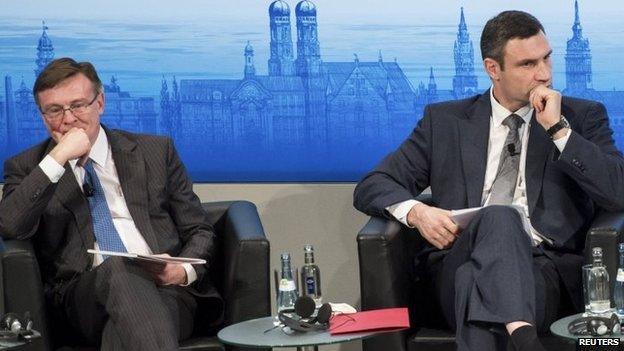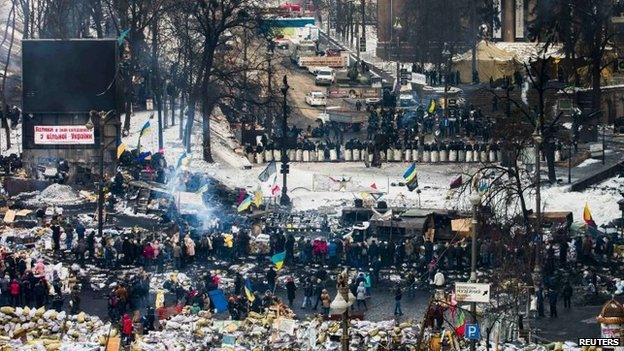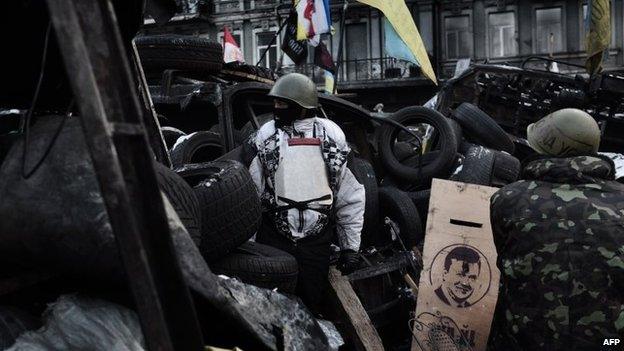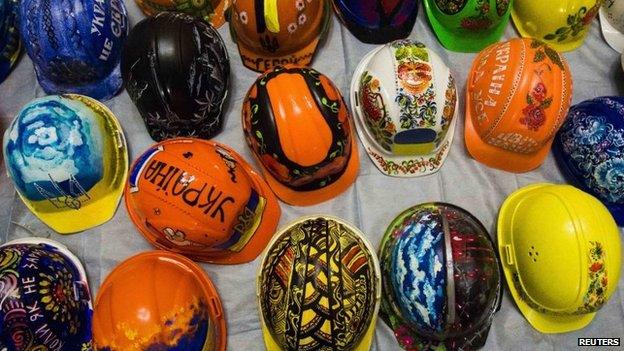Ukraine unrest: Rival politicians face off at summit
- Published

There were testy exchanges between Mr Kozhara (left) and Mr Klitschko at the security summit
Ukraine's Foreign Minister Leonid Kozhara and opposition leader Vitali Klitschko have clashed face to face at a security summit in Munich.
The two men appeared in a discussion, during which Mr Klitschko showed Mr Kozhara images of injuries he said were inflicted by the police on protesters.
Mr Kozhara suggested some of the opposition were right-wing extremists.
Ukraine has been in turmoil since November, when it scrapped an EU accord in favour of a Russian bailout.
"The Ukrainian people have shown and have proven that they are able to defend their decision on Europe despite repressive measures being taken," Mr Klitschko said, the Associated Press news agency reports.
He added that the opposition felt stronger because of the support from western friends of Ukraine.
'Extremist groups'
Earlier, European Council President Herman Van Rompuy had said the "future of Ukraine belongs with the EU" while US Secretary of State John Kerry had said the US backed Ukraine's "fight for democracy".
Russian Foreign Minister Sergei Lavrov had accused Western countries of double standards over violent protests.
After Mr Klitschko showed Mr Kozhara the images he said were of the effects of police brutality, Mr Kozhara replied by accusing some of the protesters of belonging to far-right groups.
"Are you with the extremist groups who wear some logos and emblems that looks like Nazi style emblems on them?" he asked Mr Klitschko.
"Are you with the extremists who are attacking the police with Molotov cocktails?" he added.
On the issue of whether Ukraine should orient itself more towards the EU or Russia, Mr Kozhara also pointed out that "there are eight million ethnic Russians living in the country".
"Do you think they are happy when European politicians say: 'You must make a strategic choice, you must take Ukraine away from Russia and put it somewhere else'?"
Duncan Crawford: "Dmytro Bulatov is accused of trying to instigate riots"
'Just a scratch'
The issue of Ukraine protester Dmytro Bulatov was also raised at the conference.
He went missing for eight days and said he had been kidnapped and tortured by captors who spoke with Russian accents.
He is now in hospital in Kiev under guard from both police and anti-government demonstrators.
Mr Kozhara told Al-Jazeera television; "Physically this man is in a good condition. The only thing he has is a scratch on one of his cheeks."
He went on to say it seemed that his claim to have been kidnapped and tortured was "not absolutely true".
However, the foreign ministry later issued a statement saying his comments "do not reflect the real attitude of Minister Kozhara on this tragic situation".
"The minister is profoundly sorry for what happened to Dmytro Bulatov and wishes him a speedy recovery.

Protesters continued to man barricades facing police in central Kiev on Saturday

Protesters are demanding the resignation of President Viktor Yanukovych

Protesters were asked to paint the hardhats they use in clashes with police for an impromptu art project
Sanctions possible
The Munich security conference, external is an annual event held to discuss military and political affairs.
Mr Van Rompuy's opening speech referred to the EU's offer of close association with Ukraine.
"The offer is still there and we know time is on our side. The future of Ukraine belongs with the European Union," he said.
On Saturday, Mr Kerry met Ukraine opposition leaders including Mr Klitschko and Arseniy Yatsenyuk, as well as Leonid Kozhara.
He told reporters: "Nowhere is the fight for a democratic, European future more important today than in Ukraine. The United States and EU stand with the people of Ukraine in that fight."
In an apparent swipe at Moscow, he added that "their futures do not have to lie with one country alone, and certainly not coerced".
Mr Lavrov said that a "choice is being imposed [on Ukraine] and Russia is not going to be engaged in this".
Sergei Lavrov: "What does incitement of violent street protests have to do with the promotion of democracy?"
The White House has confirmed it is discussing possible sanctions against Ukraine with the US Congress.
Before arriving in Munich, Mr Kerry said that concessions from President Viktor Yanukovych had "not yet reached an adequate level of reform".
Mr Yatsenyuk, who heads the Batkivshchyna party, recently refused an offer from President Yanukovych to become PM, one of the concessions.
President Yanukovych, who is currently on sick leave, has also tried to ease the crisis by repealing anti-protest laws, signing an amnesty for protesters and accepting the resignation of his cabinet.
However, opposition leaders are calling for his resignation and early elections.